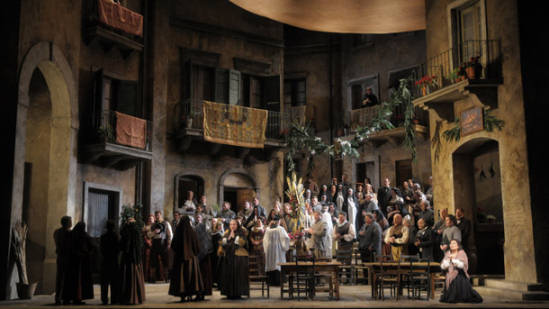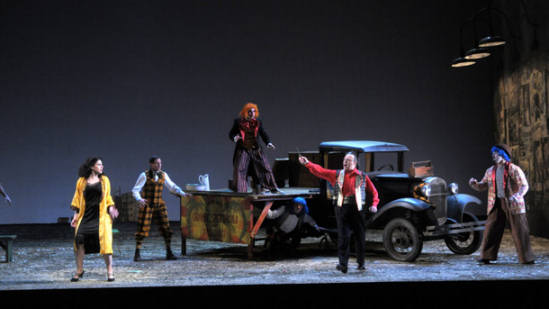Other Links
Editorial Board
-
Editor - Bill Kenny
-
Deputy Editor - Bob Briggs
Founder - Len Mullenger
Google Site Search
SEEN
AND HEARD INTERNATIONAL OPERA REVIEW
Mascagni,
Cavalleria Rusticana
/ Leoncavallo,
Pagliacci:
Soloists, Chorus and Orchestra of Lyric Opera
of Chicago, Sir Andrew David (conductor) Lyric
Opera Center, Chicago 14.2.2009 (JLZ)
Production:
Director: Elijah Moshinsky
Stage, Set and Costume Design: Michael Yeargan Hockney
Lighting: Duane Schuler
Chorus Master - Donald Nally
Conductor: Sir Andrew Davis
Cast:
Cavalleria Rusticana
Turiddu: Carlo Ventre (Vincenzo La Scola March 14-27)
As familiar as these two verismo
operas are to modern audiences, Cavalleria Rusticana
and Pagliacci remain good theater, especially in the
effective productions found at Lyric Opera of Chicago. Staged in a
realistic town square resembling nineteenth-century Calabria,
Cavalleria Rusticana benefits from fine stage and musical
direction as the work pitches from its opening at dawn on Easter
Sunday to its tragic conclusion that afternoon.
Yet the production of Leoncavallo’s Pagliacci stood out for
several reasons, not the least being the successful updating of the
staging to post-war France. The traveling band of players offered a
fine contrast on the somewhat stark rural background, and this made
the tragedy all the more realistic. As Tonio, Delavan gave an
exemplary reading of the prelude to Pagliacci, a scene that
has its parallel this season in Berg’s evocation of it at the
beginning of Lulu. With his keen sense of musical line and
clear diction, Delavan brought some subtle, ironic twists to various
passages, such that the audience was prepared for the tragic
dénouement which keep Pagliacci on stage perennially.
Santuzza: Guang Yang ( Dolora Zajick March 17-27)
Mamma Lucia: Judith Christin
Alfio: Mark Delavan
Lola: Katherine Lerner
Pagliacci
Tonio: Mark Delavan
Canio: Vladimir Galouzine
Beppe: Keith Jameson
Nedda: Ana María Martorano
Silvio:
Christopher Feigum

The Cavalleria Rusticana
Set
As the pivotal character Santuzza in the
Mascagni, Guang Yang is moving as the scorned woman whose anger
causes the murder of her erstwhile lover Turiddu, portrayed on
opening night by Carlo Ventre. Yang’s approach to the role is fully
in the style of verismo from the start, and her aria “Voi lo
sapete, o mamma” is appropriately moving and vocally impressive. Yet
Yang is particularly effective on stage with Delavan, who brings his
fine diction and stage presence to the role of Alfio, Lola’s
cuckolded husband. The duet “Oh! Il Signore vi manda” shows the two
performers well, as they bring their characters’ situations to the
forefront persuasively. Delavan commands the stage as Alfio should,
and his solid vocal presence allows him to be a fine foil for
Turiddu. Ventre, whose serenade to Lola opened the work, was
somewhat slow to warm to the acoustic of the Civic Opera, but by the
time he sang the famous brindisi, he seemed accustomed to the hall.
Unsung, but very important, Sir Andrew
Davis delivered the score most effectively, with tempos that
set the stage as much as the designs did. Sometimes overtly
symphonic, the instrumental passages benefited from the shaping
Davis gave them, especially in the well-known Intermezzo. Through
such a fine, if somewhat objectified, reading of the score, Davis
allowed the music to speak for itself, without the indulgence which
can occur in the hands of less experienced conductors.

The Pagliacci Set
Vladimir Galouzine approached the title role aggressively, and while
that fit the character he depicted, it was sometimes at the expense
of the musical line. A performer of Galouzine’s caliber could bring
a somewhat softer approach to some of the lines, which work equally
well in a more understated way. Nevertheless, Galouzine was fully in
command of “Vesti la giubba,” which ends the first of the two acts.
Yet as Nedda, the soprano Ana María Martorano was captivating. Her
only aria, “Stridono lassù” was appropriately effortless, as Nedda
meditates on the freedom the birds have, but which is impossible for
her to achieve. In the subsequent passages, including duets with
Christopher Feigum as Silvio, Martorano remained in character
vocally and dramatically. In fact, all of the principals in this
production were uniformly even in their roles and this, in turn,
allowed the familiar Pagliacci to stand out for a delivery
worthy of festival performances. Again, Andrew Davis’ conducting
contributed the appropriate timing to the final scenes as
Pagliacci’s jealousy finds expression in murdering Nedda and,
ultimately, Silvio. Here Delavan’s timing rounds out the evening as
Tonio’s prologue finds an ironic conclusion in the closing lines in
which he declares the comedy to be ended.
It was ironic to find the premiere of this traditional double-bill
on Valentine’s Day, but such programming cannot always be avoided.
This was another fine production of the current season, and it is to
Lyric’s credit that it can bring great casts to Chicago so that even
familiar operas like Cav and Pag, as they are called,
can seem wonderfully fresh. The production continues through March,
and those visiting Chicago can still enjoy these operas – the cast
change already announced brings back to Lyric’s stage the familiar
presence of Vincenzo La Scola and Dolora Zajick in Cavalleria
Rusticana.
Pictures ©
Dan Rest/Lyric Opera of Chicago
Back
to Top
Cumulative Index Page
